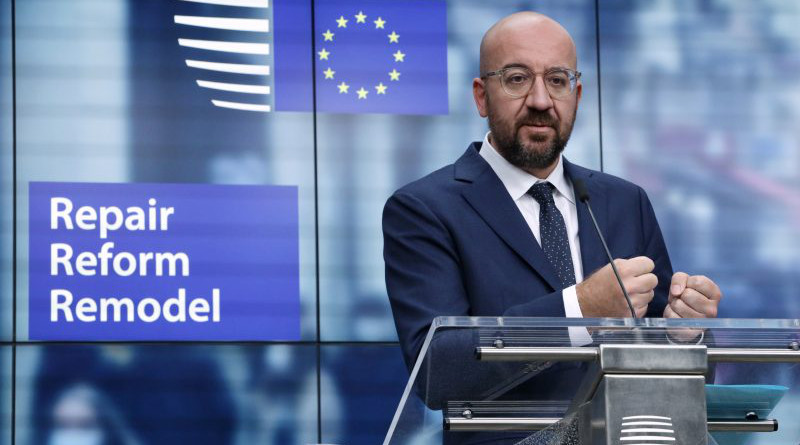Michel Gives Control To EU Member States To Facilitate Recovery Fund Deal
By EurActiv
By Jorge Valero
(EurActiv) — European Council President Charles Michel proposed on Friday (10 July) giving more control to member states over the recovery funds to overcome northern member states’ opposition to the ambitious stimulus.
In parallel, his proposal reduced the overall spending of the multiannual financial framework for 2021-2027, the EU’s long-term budget, by around €20 billion to €1,074 billion, to please the ‘frugal’ capitals.
Michel put forward a negotiating box to narrow the important differences among the national governments over the European Commission’s proposal for a €750 billion recovery fund. The draft document will be the basis for the EU leaders summit on 17-18 July.
“The goals of our recovery can be summarised in three words: first convergence, second resilience and transformation. Concretely, this means: repairing the damage caused by COVID-19, reforming our economies, remodelling our societies,” he told reporters in a video-press conference
Michel made a plea to all EU governments, national parliaments and the European Parliament to understand the “constrains and sensitivities” in every member state “to make the agreement possible” this month.
A senior EU official, however, admitted that the negotiations continued to be “very difficult”.
Some of the main stumbling blocks are the size of the fund and the volume of non-reimbursable funds (grants), a total of €500 billion in the Commission’s original proposal.
Northern member states, in particular the ‘Frugal four’ (Netherlands, Austria, Sweden and Denmark), are against the large volume of grants, and instead prefer to offer loans to countries hard-hit by the pandemic.
Conditionality
Michel kept the Commission’s ambition for the recovery fund but detailed the conditions to access the fund. Member states will also have more powers to validate their national plans and to decide on the disbursement of the funds.
His draft text said that member states’ recovery and resilience plans to unlock the funds will be assessed by the Commission within two months of submission.
Their proposals will be approved depending on their “consistency with the country-specific recommendations, as well as strengthening the growth potential, job creation and economic and social resilience of the member state”. Their contribution to the green and digital transition will be also a “prerequisite”.
A senior EU official did not clarify whether the economic resilience would include fiscal adjustments.
Michel’s text strengthened the wording from the Commission’s original plan, where there was only a vague reference to the digital and green transitions and European Semester recommendations.
Northern member states, however, requested tougher conditionality to access the European aid.
The Netherlands and other countries also asked for political control through the Council, instead of the technical oversight of national envoys (‘comitology’) initially proposed by the Commission to authorise the national recovery plans.
Member states should validate them by qualified majority four weeks after the Commission gives its opinion.
In total, member states should know whether their plans receive a positive assessment three months after submission.
National governments will also have a say in deciding on the disbursement of the funds, according to the completion of milestones to implement the national recovery plans.
Michel admitted that having an agreement on the governance of the fund will be “difficult” because member states have “totally different opinions on this topic”.
Northern countries’ opposition towards grants is arguably the main obstacle to overcome, as the €500 billion non-reimbursable transfers are at the core of the Commission’s plans to overcome the coronavirus crisis.
In addition to the tight grip and oversight of their use, Michel also offered some sweeteners to the net contributors to the EU budget, who would maintain the rebates, the money they get in return to compensate for smaller returns from the EU budget.
The European Council president also tried to win the European Parliament’s consent by offering more clarity on the new taxes and levies that will be created to pay back the €750 billion that the EU will borrow from the markets
Michel expects to have a plastics levy already applied on 1 January 2021, which could generate up to €3 billion annually. The carbon border tax and a digital levy should be introduced two years later. Proposals on a new Emission Trading System and other new own resources, such as a financial transaction tax, would come by the end of 2027.
One of the main novelties of Michel’s proposal is the introduction of a €5 billion special Brexit Adjustment reserve. The new mechanism would support sectors and regions hit hard by UK’s withdrawal from the EU, although the Commission should work on the proposal.

